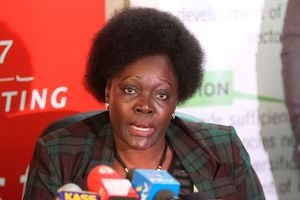
FKF Vice president Dorris Petra (right) and president Nick Mwendwa arrive at Kandanda House in Nairobi on October 14, 2024 to present their papers for their joint ticket for the FKF presidential elections
As the Football Kenya Federation (FKF) Electoral Board continues preparations for the upcoming elections, several key concerns raised by stakeholders remain unresolved, casting doubt over the process.
Candidates, clubs, Sports Registrar Rose Wasike, and the Ministry of Sports have all expressed reservations, with Wasike warning that failure by the FKF and its electoral board to fully comply with Kenyan laws could result in numerous court cases.
This, she cautions, could jeopardise Kenya’s co-hosting bid for the 2024 African Nations Championship (CHAN) and the 2027 Africa Cup of Nations (Afcon) with Uganda and Tanzania.
The FKF national elections are scheduled for December 7, following county-level elections set for November 9. Yesterday, candidates for the FKF presidency, their running mates, and National Executive Committee (NEC) members submitted their nomination papers to the electoral board at Kandanda House in Nairobi.
However, controversy has arisen over the board’s decision to operate from Kandanda House, which also serves as FKF headquarters.
Several aspirants have questioned the impartiality of the electoral board. FKF presidential candidate Sammy "Kempes" Owino voiced concerns, saying, “It validates our concerns that they are not independent, but just an extension of the FKF.”
Murang’a Seal vice chairman, Hussein Mohammed, also running for FKF president, echoed these sentiments, arguing that the board should demonstrate its independence by moving to a neutral location and work with the Independent Electoral Boundaries Commission (IEBC) to ensure a credible and transparent process.
On September 25, Sports Cabinet Secretary, Kipchumba Murkomen, while addressing Parliament, stated the government's willingness to provide the electoral board with a neutral facility.
“I’m going to have a meeting with the electoral board to see if we can lend them a neutral government facility to operate their elections from and whether we can find ways of supporting them technically through IEBC so that the elections can be as transparent as possible,” Murkomen said.
Despite these concerns, Electoral Board Chairman, Hesbon Owilla, defended the decision to remain at Kandanda House, citing the FKF Electoral Code.
“Under the Electoral Code Section 3 1(g), the headquarters of the electoral board shall be the same as those of FKF unless the board itself decides otherwise. This position was ratified by the SGM held on August 24, 2024,” Owilla explained in a statement on October 5.
In an 18-page letter dated October 11 and seen by Nation Sport, Wasike urged the electoral board to comply with all Kenyan laws to avoid litigation.
The letter, copied to Murkomen, PS Peter Tum, and Sports Disputes Tribunal (SDT) Chairman, John Ohaga, criticised FKF for failing to align its Constitution and Electoral Code with Kenyan laws, accusing the federation of "hiding" under FIFA Statutes.
She further called for an investigation into officials seeking a third term despite already serving two four-year terms.
She specifically pointed out FKF President Nick Mwendwa and Vice President Doris Petra, who have submitted their candidacy in a joint ticket, with Petra running for president and Mwendwa as her running mate.
“The insistence by some officials to seek a third term in office, despite having served two four-year terms, should be investigated and the said individuals barred from vying for the same or different positions,” Wasike stated.
Murkomen has repeatedly vowed that the Ministry will ensure officials who have served two terms are not re-elected.
Wasike also criticised the FKF for violating Section 46 (6) of the Sports Act by maintaining clauses in the Electoral Code that block certain candidates from participating. Section 46 (6) mandates that all national sports organisations be open to the public in leadership, activities, and membership.
According to the current Electoral Code, candidates must have held specific roles within FKF or football circles for two of the last five years to be eligible to run.
Owino has filed a case before the Court of Arbitration for Sport (CAS) in Switzerland, seeking FIFA's intervention and the formation of a Normalisation Committee to oversee the elections.
“The path initiated by FKF through the just concluded Special General Meeting (SGM) will not result in free, fair, and credible elections,” Owino said, adding, “It will also result in continued litigation.”
In her letter, Wasike also raised concerns about FKF conducting elections for its branches in counties where legally registered County Football Sports Associations already exist under the Sports Act.
She urged the electoral board to cancel all branch elections and instead use legally recognized county associations as voters.
“Adherence to the above provisions of the law among others will go a long way in holding peaceful and credible elections that will not be a subject of complaints and court cases from stakeholders,” Wasike emphasised.
She also warned that failure to follow the law could lead to Kenya facing a potential ban from FIFA, an issue that would be especially damaging as the country prepares to co-host CHAN in 2025 and Afcon in 2027.
Meanwhile, the Sports Disputes Tribunal (SDT) issued a temporary order on Thursday, preventing the publication of the register of clubs eligible to vote. This decision followed a petition from FKF Kakamega branch Vice Chairman, Geophrey Mudembei, who raised concerns over alleged irregularities in the voter register. The case will come up for mention on October 22.
Wasike concluded her letter by urging FKF and the Electoral Board to ensure compliance with national laws to restore the credibility of Kenyan football governance, stating, “It is not too late for FKF and the Electoral Panel/Board to save Kenyan football, and correct any mischief that might have been caused knowingly or unknowingly.”









